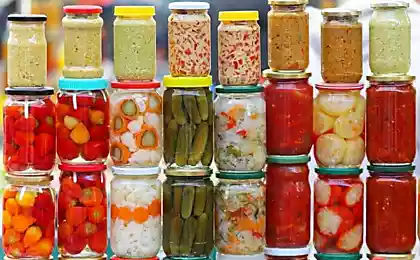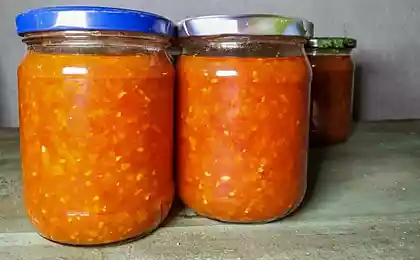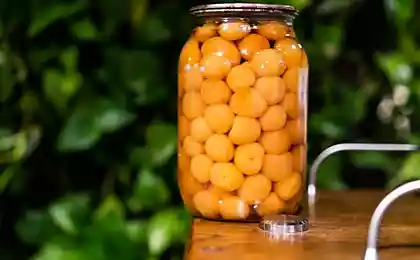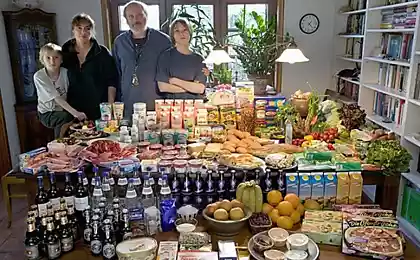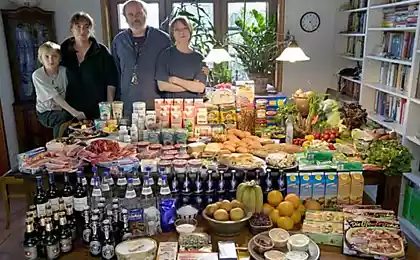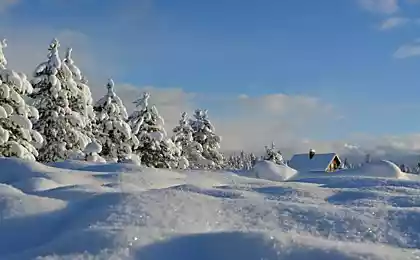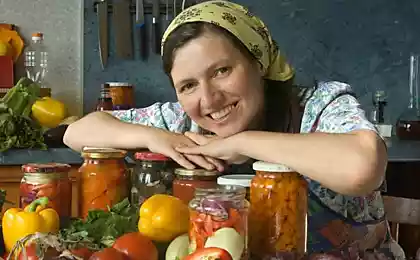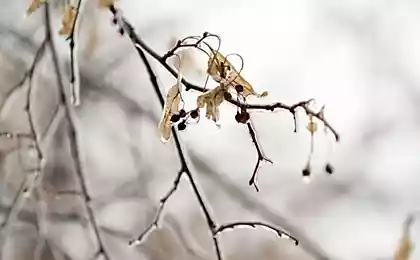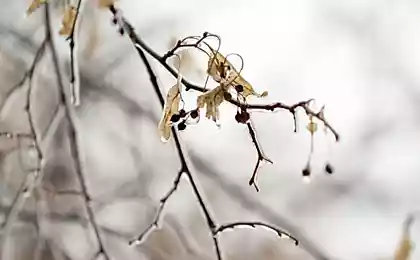514
How to survive the winter on their products
Somewhere in the middle of winter, everybody gets vitamin starvation, which we try to compensate with fruit and vegetables brought to distant lands. Often these products are "vitamin" is not only useless, but also leave a huge footprint of transport, for which we have to pay a lot of money. Let's look at how we can compensate for vitamin hunger our products.
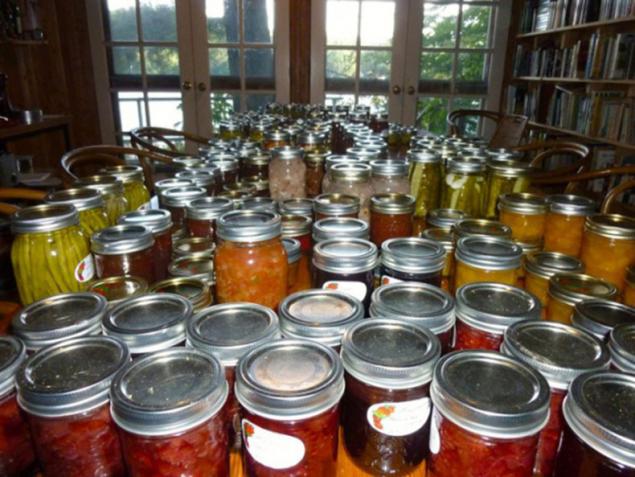
Local products in the winter.
In the local market we will purchase the root vegetables, if stored properly in the cellar, the soil is dry, they perfectly retain their useful properties.
In winter, we mostly eat: beets, onions, potatoes, carrots, parsnips, radishes. Assembled it all together with cabbage, cauliflower and greens. The most popular and known to us from the middle ages garlic, onions and leeks are great help to protect us from the cold.
The greens are now often grown in greenhouses year-round on private land to their even no feed, so we take the parsley, dill from the local farmers. Green onions can be freely grown on the windowsill.
The most difficult thing about local products in winter, the monotony in the diet. Sometimes it is hard to see the cabbage and potatoes and we throw ourselves into these oranges, persimmons and bananas. Although they brought in some green and find a really ripe bananas, it turns out is not easy, not to mention how this business is not clean.
As previously outlasted the winter
Sometimes we wonder how early people lived thousands of years without importing products from tropical countries. Patiently waiting for spring...
1. Posts
The post not in the belly, and in the spirit
Proverb
We have this resulted in a developed culture and traditions of consumption. First it posts. The first winter post was prior to Christmas carols and Christmas, the second from late February to April, Great Post. This allowed me to not salakalahti the body and on the spiritual level to endure vitamin the hunger.
2. Twist and fermentation.
Our culture twists in the world has an equal and conscious consumers from the West are trying to adopt this habit. Many young people are struck why these "unadvanced" so many parents squirm at the cottage and doing so many different twists for the winter.
But a shift in culture and loss of skills for preserving foods has led the developed countries to the fact that they are simply thrown away up to 30% of the products in a landfill. This is a huge damage to the planet, since their production takes an incredible amount of water and resources.
The freezer is not an option.
Now there is a perception that preserving foods is not useful and all need to be stored in the freezer. In fact, this has led to the fact that in every house began to shove huge closets, fridges and freezers, which are literally covered in ice cream products. Is this useful? How many coal mines should now throw CO2 into the atmosphere to energize these cabinets in every home. The radiation? Design your kitchen with no refrigerator, this is the future of conscious life.
3. Cereals
What's for lunch, porridge if not.
The power of the Slavs was always kept in the cereals. In our storage always stored cereals: buckwheat, barley, millet, wheat, etc. We eat them alternately and twists the type of pickled cucumbers, tomatoes and cabbage, winter passes quickly.
On Christmas, we traditionally prepare the pudding, it is full of vitamins. And so we like it, this is not a dish one evening, but rather a dish of the day. Of course in the winter we like to do different cakes, but sometimes they are stale and the pudding dish and easy and hearty and almost never boring.
4. The winter fruit.
We have a garden that we are now actively doazepam all new bushes and trees. They give us apples, which stand all winter. Apples, it is also generally our product, which is rarely where it is still as popular as ours. By the end of winter it really goes well with the artichoke, it's juicy and full of vitamins, and eat well children.
5. Honey, jam, compotes, and dried fruit.
Winter makes me feel very sweet, especially to children. So we are storing more different jam and honey, candy. Do not pass up these sweet treats, make yourself a drying and dry themselves. Sugar, like Cola and soda, not too useful for kids, so we try to look for an alternative to candy, candy and sweets. Also make compotes and stewed fruits.
6. Beans and mushrooms.
The winter product, which replaces the meat is of course legumes: beans, peas and, less frequently, beans. Now for the winter freeze the snow peas, but dried environmentally friendly. Freeze better that takes up little space, for example condiments: spinach or dill.
The mushrooms have dried and twist, and the winter mushroom soup popular any soup or borsch.
There are certainly more fish, which is recommended in the posts. But now with the fish population it happens that soon we'll all be vegetarians necessarily.
7. Support the farmer.
Even if we buy fruits and vegetables that do not grow, we try to let the seller was the manufacturer. From Azerbaijan to us every winter comes Farid, to sell grenades. He holds a tattered printout of a photograph of his garden. And we always take his grenades.
It's so cool to have a supplier of natural products and he always gave you the discount and pick the most ripe fruit. Find your "Farid" in the city and he will always smile to you at the meeting. What a joy to shoot with supermarket shelves packaged in plastic products to listen to the monotonous beeping of cash registers and look in the colorless eyes tired cashiers and "type of business" customers, when next in the market, the life of these people.
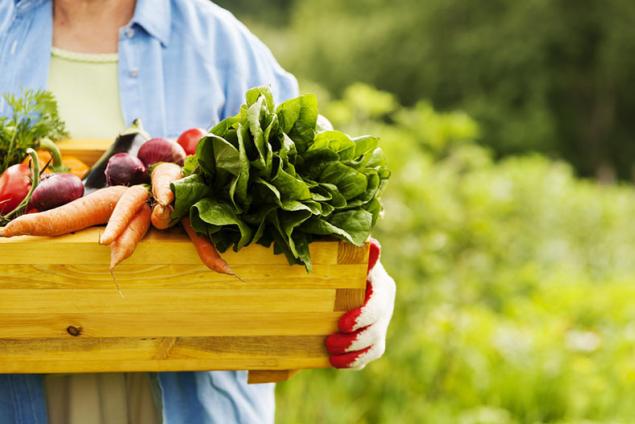
8. Look for like-minded
We found the city club of Organic farming, the club of growers and beekeepers, gardeners and vegetarinan and people leading a healthy lifestyle. I try to attend conventions and meetings to exchange experience and knowledge. It helps a lot. Sometimes just an exchange of emotions this is great.
You can often obtain useful information about some farmer who grows something natural and make a joint order. We do flax oil and often will exchange it for dried herbs and spices that to someone in the club has collected in the mountains. A community of like-minded people is much easier task to survive the winter on local products. published
P. S. And remember, only by changing their consumption — together we change the world! © Join us at Facebook , Vkontakte, Odnoklassniki
Source: vk.com/vselo?w=wall-21920914_6862

Local products in the winter.
In the local market we will purchase the root vegetables, if stored properly in the cellar, the soil is dry, they perfectly retain their useful properties.
In winter, we mostly eat: beets, onions, potatoes, carrots, parsnips, radishes. Assembled it all together with cabbage, cauliflower and greens. The most popular and known to us from the middle ages garlic, onions and leeks are great help to protect us from the cold.
The greens are now often grown in greenhouses year-round on private land to their even no feed, so we take the parsley, dill from the local farmers. Green onions can be freely grown on the windowsill.
The most difficult thing about local products in winter, the monotony in the diet. Sometimes it is hard to see the cabbage and potatoes and we throw ourselves into these oranges, persimmons and bananas. Although they brought in some green and find a really ripe bananas, it turns out is not easy, not to mention how this business is not clean.
As previously outlasted the winter
Sometimes we wonder how early people lived thousands of years without importing products from tropical countries. Patiently waiting for spring...
1. Posts
The post not in the belly, and in the spirit
Proverb
We have this resulted in a developed culture and traditions of consumption. First it posts. The first winter post was prior to Christmas carols and Christmas, the second from late February to April, Great Post. This allowed me to not salakalahti the body and on the spiritual level to endure vitamin the hunger.
2. Twist and fermentation.
Our culture twists in the world has an equal and conscious consumers from the West are trying to adopt this habit. Many young people are struck why these "unadvanced" so many parents squirm at the cottage and doing so many different twists for the winter.
But a shift in culture and loss of skills for preserving foods has led the developed countries to the fact that they are simply thrown away up to 30% of the products in a landfill. This is a huge damage to the planet, since their production takes an incredible amount of water and resources.
The freezer is not an option.
Now there is a perception that preserving foods is not useful and all need to be stored in the freezer. In fact, this has led to the fact that in every house began to shove huge closets, fridges and freezers, which are literally covered in ice cream products. Is this useful? How many coal mines should now throw CO2 into the atmosphere to energize these cabinets in every home. The radiation? Design your kitchen with no refrigerator, this is the future of conscious life.
3. Cereals
What's for lunch, porridge if not.
The power of the Slavs was always kept in the cereals. In our storage always stored cereals: buckwheat, barley, millet, wheat, etc. We eat them alternately and twists the type of pickled cucumbers, tomatoes and cabbage, winter passes quickly.
On Christmas, we traditionally prepare the pudding, it is full of vitamins. And so we like it, this is not a dish one evening, but rather a dish of the day. Of course in the winter we like to do different cakes, but sometimes they are stale and the pudding dish and easy and hearty and almost never boring.
4. The winter fruit.
We have a garden that we are now actively doazepam all new bushes and trees. They give us apples, which stand all winter. Apples, it is also generally our product, which is rarely where it is still as popular as ours. By the end of winter it really goes well with the artichoke, it's juicy and full of vitamins, and eat well children.
5. Honey, jam, compotes, and dried fruit.
Winter makes me feel very sweet, especially to children. So we are storing more different jam and honey, candy. Do not pass up these sweet treats, make yourself a drying and dry themselves. Sugar, like Cola and soda, not too useful for kids, so we try to look for an alternative to candy, candy and sweets. Also make compotes and stewed fruits.
6. Beans and mushrooms.
The winter product, which replaces the meat is of course legumes: beans, peas and, less frequently, beans. Now for the winter freeze the snow peas, but dried environmentally friendly. Freeze better that takes up little space, for example condiments: spinach or dill.
The mushrooms have dried and twist, and the winter mushroom soup popular any soup or borsch.
There are certainly more fish, which is recommended in the posts. But now with the fish population it happens that soon we'll all be vegetarians necessarily.
7. Support the farmer.
Even if we buy fruits and vegetables that do not grow, we try to let the seller was the manufacturer. From Azerbaijan to us every winter comes Farid, to sell grenades. He holds a tattered printout of a photograph of his garden. And we always take his grenades.
It's so cool to have a supplier of natural products and he always gave you the discount and pick the most ripe fruit. Find your "Farid" in the city and he will always smile to you at the meeting. What a joy to shoot with supermarket shelves packaged in plastic products to listen to the monotonous beeping of cash registers and look in the colorless eyes tired cashiers and "type of business" customers, when next in the market, the life of these people.

8. Look for like-minded
We found the city club of Organic farming, the club of growers and beekeepers, gardeners and vegetarinan and people leading a healthy lifestyle. I try to attend conventions and meetings to exchange experience and knowledge. It helps a lot. Sometimes just an exchange of emotions this is great.
You can often obtain useful information about some farmer who grows something natural and make a joint order. We do flax oil and often will exchange it for dried herbs and spices that to someone in the club has collected in the mountains. A community of like-minded people is much easier task to survive the winter on local products. published
P. S. And remember, only by changing their consumption — together we change the world! © Join us at Facebook , Vkontakte, Odnoklassniki
Source: vk.com/vselo?w=wall-21920914_6862
Art Deco interior small apartment
Beauty is always simple. 5 good tips to women from pragmatics and mathematics.







